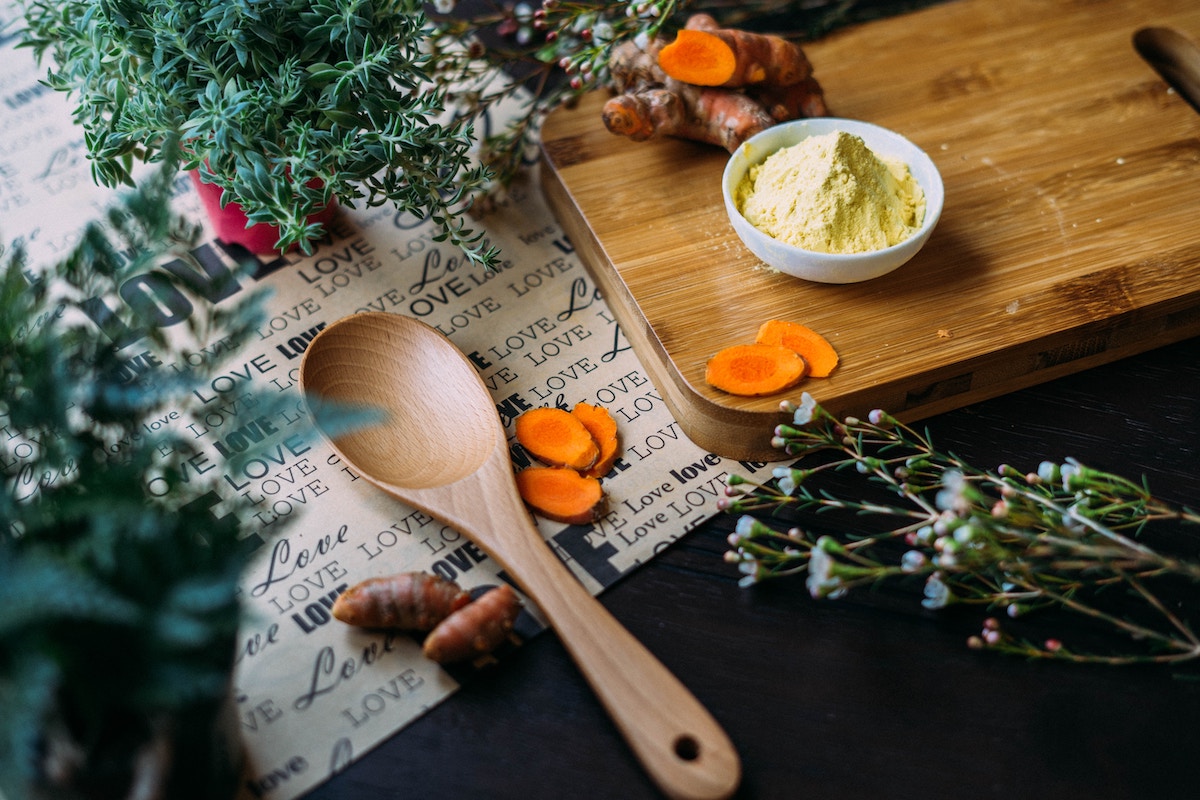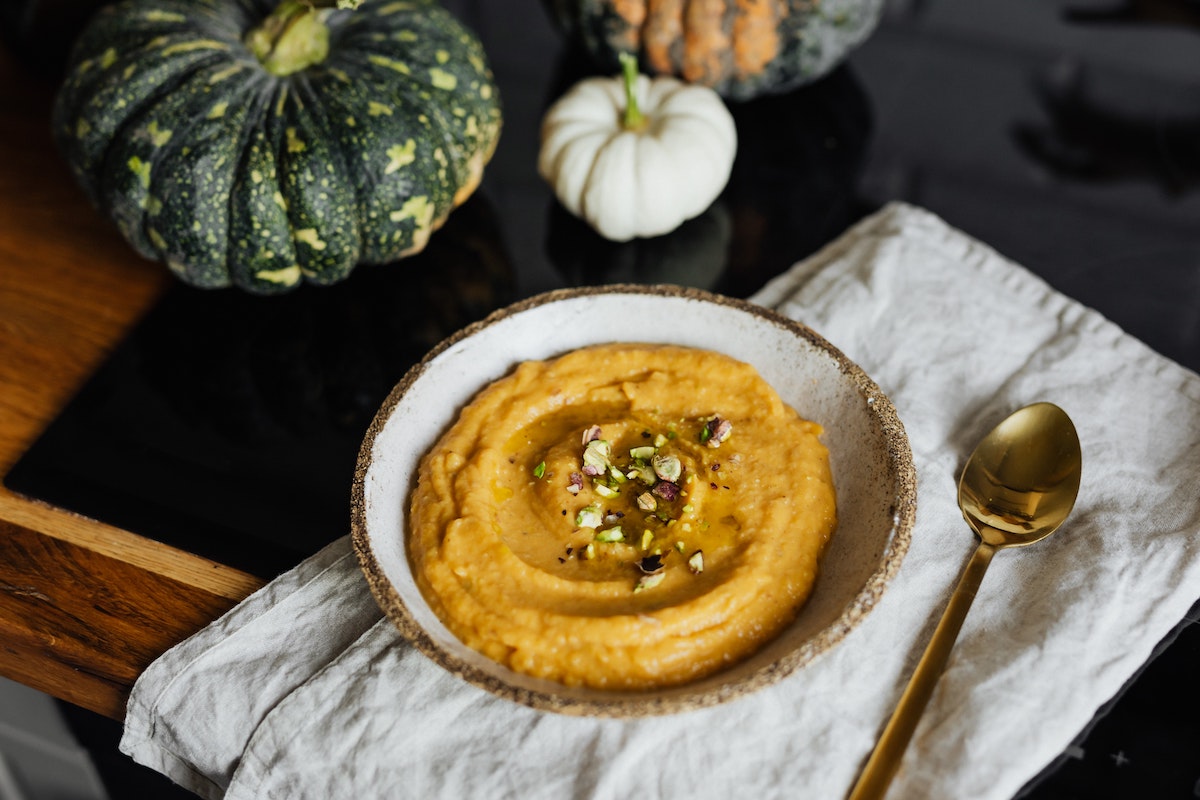
Gut health is all the rage on social media these days. Scroll through TikTok or Instagram, and you’ll see videos and tiles about the microbiome. Some creators may promote gut health supplements, usually probiotics or prebiotics. Most doctors and dieticians suggest food as a first-line treatment.
Do you know what else is everywhere in the fall? In August, pumpkin-spiced lattes, cookies, teas, and other bites and beverages hit shelves and menus nationwide. Fall doesn’t begin until late September, but pumpkin season has arrived. More than a gourd or Halloween decoration, pumpkin is a food. Sometimes, pumpkin is used as a flavoring, while other times, the gourd is the food. Either way, is pumpkin good for gut health? Can we combine the two trends deliciously, giving people searching for how to fix gut health naturally a viable option?
The short answer is yes. We got two registered dieticians to spill the (pumpkin) seeds for a more comprehensive explanation.

What is gut health?
Before digging into the details on pumpkins and gut health, let’s back up for a moment. The term is everywhere, but what is gut health?
“The gut microbiome refers to the trillions of microbes that live in the digestive tract,” said Mia Syn, MS, RDN, a registered dietician for Chobani.
Syn says the science on the gut microbiome is still new. However, there’s new evidence that maintaining good gut health is beneficial.
“Current research suggests that [gut health] is one of the most important regulators of overall health with a potential effect on digestion, immunity, weight, skin, allergies, hormones, and more,” Syn said.
The gut may also factor into mental health.
“The gut and brain are connected through the gut-brain axis,” said Kaitlyn Willwerth MS, RD, CLT, a registered dietician with OnPoint Nutrition. “Gut health can influence neurotransmitter activity, mood, and overall mental health. This connection is why the gut is often referred to as the second brain.”

How to improve gut health naturally
Though people may be tempted to try gut health supplements pushed on social media, experts say that route generally isn’t necessary. Diet is the primary way to fix gut health naturally.
“What we eat has a significant impact on gut health,” Syn said.
Syn explained that some foods support a balanced gut microbiome. Others do the opposite, promoting an imbalance associated with conditions like:
- Irritable bowel syndrome
- Obesity
- Type 2 diabetes
That said, fixing gut health can be complicated, and it’s important to rule out underlying conditions. If you have questions about how to improve gut health naturally or find dietary tweaks aren’t helping, speak with your primary care physician. Your doctor may be able to provide advice or you with a referral to a dietician for more assistance.
Is pumpkin good for the gut?
Yogurt and fermented food and drinks like Kefir are among the probiotic-rich foods doctors recommend to people looking to improve or maintain good gut health. However, dieticians share that pumpkin is good for the gut, too.
Willwerth said pumpkin is:
- A good source of dietary fiber. Willwerth says dietary fiber promotes regular bowel movements and feeds “good” gut bacteria.
- Full of vitamins and minerals. Pumpkin contains vitamins A, C, and E and minerals like magnesium. “All of [these] can promote a healthy gut lining and overall gut health,” Willwerth said.
- Low in FODMAPs. Since pumpkins are naturally low in fermentable carbs (or FODMAPs), Willwerth said they are suitable for people with sensitive guts or conditions like irritable bowel syndrome (IBS).
- Rich in antioxidants. These antioxidants can lower inflammation and ward off gut damage, according to Willwerth.
Five gut-friendly pumpkin-flavored foods
Some of these recipes involve real-deal pumpkin, while others are made from other pumpkin-flavored goodies like pumpkin-spice yogurt. Regardless, these foods can help you get your fall fix and improve gut health naturally.
- Pumpkin spice smoothie. Move over, PSL. Willwerth suggests blending a bit of pumpkin for a double dose of gut-friendly fare. “Combining pumpkin with Greek yogurt not only provides a delicious fall flavor but also offers probiotics from the yogurt,” she said.
- Pumpkin overnight oats. Another perfect option for breakfast, Syn suggests combining rolled oats, chia seeds, pumpkin-spice flavored yogurt, and pumpkin-spice flavored oat milk (she loves Chobani’s new Oat-Based Pumpkin Spice). “Rolled oats are a source of prebiotic fiber,” Syn said, adding that this fiber aids in the selective nourishment of good gut bacteria.
- Pumpkin and chia seed pudding. Like the overnight oats but in dessert-ready pudding form, Willwerth says the high fiber in chia seeds and pumpkin are suitable for the gut.
- Creamy Cream-Less Pumpkin Soup. This savory, low-fat option involves olive oil, yellow onion, garlic, pumpkin, russet potato, low sodium vegetable broth, nutmeg, pumpkin pie spice, salt, and pepper. “This low-fat soup recipe gets its creamy flavor from pureed root veggies, pumpkin, and russet potatoes instead of cream or butter. It also gets its natural sweetness from pumpkin rather than added sugar,” Syn said. High dietary fat and added sugar can cause gut issues.
- Roasted pumpkin quinoa salad. Lunch plans, found. Syn says this meal idea includes pumpkin, quinoa, mixed greens, pumpkin seeds, pomegranate arils, feta cheese, extra virgin olive oil, apple cider vinegar, salt, and pepper. “This salad is made with similar nutrient-rich ingredients and is packed with fiber from pumpkin, quinoa, and greens, which helps contribute to a healthy gut,” Syn said.



